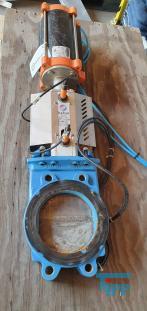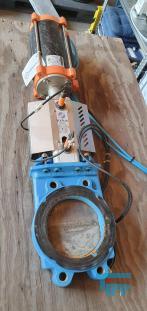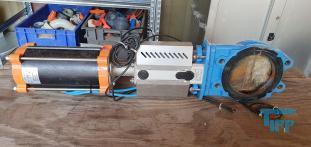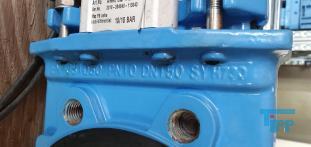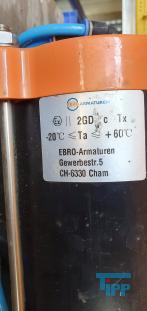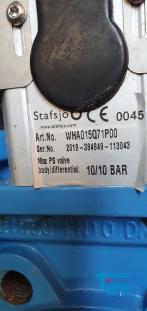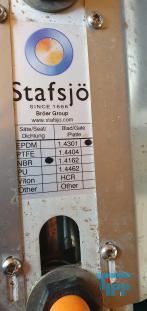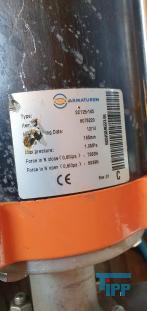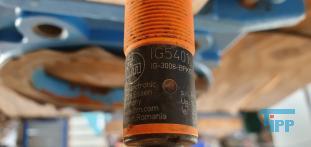used pneumatic slide gate / knife gate valve
details to article: 30109
| Producer: | EBRO |
| Typ: | SC125-165 |
| Year of manufacture: | 2016 |
| Pieces: | 1 |
| Condition: | gebraucht / used / second hand |
Alle Angaben, Bilder, Hinweise und Empfehlungen erfolgen nach bestem Wissen, je- doch ohne Gewähr. Änderungen der technischen Angaben bleiben vorbehalten.
informations about: fittings / shut-off-valves / valves / ball valves Pipe fitting is the occupation of installing or repairing piping or tubing systems that convey liquid, gas, and occasionally solid materials. This work involves selecting and preparing pipe or tubing, joining it together by various means, and the location and repair of leaks. Pipe fitting work is done in many different settings: HVAC, manufacturing, hydraulics, refineries, nuclear-powered Supercarriers and Fast Attack Submarines computer chip fab plants, power plant construction and other steam systems. Pipe fitters (sometimes called simply "fitters") are represented in the USA and Canada by the United Association of Journeymen and Apprentices of the Plumbing and Pipe Fitting Industry of the United States and Canada. Fitters work with a variety of pipe and tubing materials including several types of steel, copper, iron, aluminium, and plastic. Pipe fitting is not plumbing; the two are related but separate trades. Pipe fitters who specialize in fire prevention are called Sprinklerfitters, another related, but separate trade. Materials, techniques, and usages vary from country to country as different nations have different standards to install pipe. A valve is a device that regulates, directs or controls the flow of a fluid (gases, liquids, fluidized solids, or slurries) by opening, closing, or partially obstructing various passageways. Valves are technically pipe fittings, but are usually discussed as a separate category. In an open valve, fluid flows in a direction from higher pressure to lower pressure. The simplest, and very ancient, valve is simply a freely hinged flap which drops to obstruct fluid (gas or liquid) flow in one direction, but is pushed open by flow in the opposite direction. Valves are used in a variety of contexts, including industrial, military, commercial, residential, and transport. The industries in which the majority of valves are used are oil and gas, power generation, mining, water reticulation, sewage and chemical manufacturing.[citation needed] In daily life, most noticeable are plumbing valves, such as taps for tap water. Other familiar examples include gas control valves on cookers, small valves fitted to washing machines and dishwashers, safety devices fitted to hot water systems, and valves in car engines. In nature, veins acting as valves are controlling the blood circulation; heart valves control the flow of blood in the chambers of the heart and maintain the correct pumping action. Valves play a vital role in industrial applications ranging from transportation of drinking water to control of ignition in a rocket engine. Valves may be operated manually, either by a handle, lever or pedal. Valves may also be automatic, driven by changes in pressure, temperature, or flow. These changes may act upon a diaphragm or a piston which in turn activates the valve, examples of this type of valve found commonly are safety valves fitted to hot water systems or boilers. More complex control systems using valves requiring automatic control based on an external input (i.e., regulating flow through a pipe to a changing set point) require an actuator. An actuator will stroke the valve depending on its input and set-up, allowing the valve to be positioned accurately, and allowing control over a variety of requirements. From Wikipedia, the free encyclopedia | |||||||||||||||||||||||||||||||||||
| email: mail@tipp-international.de | |||||||||||||||||||||||||||||||||||
| Internet: www.tipp-international.de | |||||||||||||||||||||||||||||||||||










